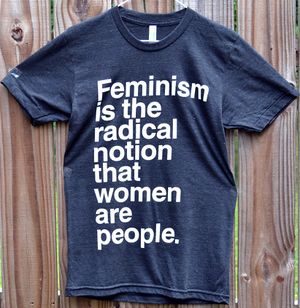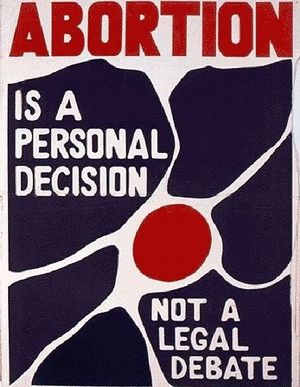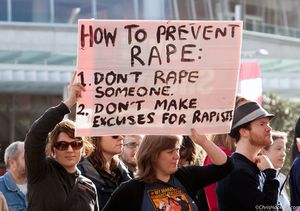Feminism and its Role in Society
Overview
The relevance of feminism in today's society is in a state of constant debate and controversy. This may be due to the many negative connotations that have become attached to the notion of feminism. Many find that feminism is simply just females trying to rise above males. However, a large number of feminists state that their goals are not to rise above men, and instead, find equality among them. No matter how strong the debate against feminism becomes, feminists still passionately advocate for it's relevancy and purpose. There are many topics that a feminist may choose to confront in order to support the importance of feminism. These topics range from the representation of the female body, her reproductive health, and rape culture.
Representation of The Female Body
Body Hair
In today’s world, a hairless body is greatly associated with beauty. Corporations have been profiting off the female body by convincing her that the rawest and most natural version of her is ugly, whether that includes having leg hair, underarm hair, a uni-brow, etc. In a study, Basow and Braman (1998) showed college students a video of a woman with and without leg and underarm hair. The results were supported by their hypothesis which predicted that when the woman is shown with hair, she will be considered less attractive. In addition to this, she was also viewed as less sociable, intelligent, happy, and positive than the photo without any body hair. It's clear that we are all taught to view female body hair as ugly. If a women chooses to not shave, she may be considered unattractive, and even lazy and untidy. If females love themselves, corporations will not be able to make a profit off their bodies. This is the kind of belief that feminism plays an important role in fighting against. Feminists confront this issue by challenging the idea of beauty and reclaiming control of their own bodies. In this way, feminism allows females to choose whether they want to shave or not. It gives them the choice of defining their own personal idea of beauty, instead of the definition that the media has given beauty.
Clothing
A female's choice of clothing is another issue that is confronted by feminists. If a female is revealing too much “skin,” she is prone to being labeled as "too easy." However, if she is completely covered, then she is labeled as a "prude" or someone that is "too boring." Females are looked down upon in these two ways, which both contradict each other. Either it is too much skin or simply too little, and she is shamed for both choices. Females are also told to “respect themselves” if they are showing too much skin. It is extremely normalized for males to wear shorts and be shirtless, however, in many occasions, a female is ridiculed for showing her skin. As stated, if a women is showing absolutely no skin at all, she may not be celebrated and instead, be turned away because she is “boring.” Feminists try to confront this issue by again, reclaiming their bodies and exerting their own definition of respect. This is an issue that still rises from time to time in today’s day and age, and feminists wholeheartedly believe that feminism plays a strong role in breaking this barrier by allowing women to feel liberated and respected for their own choices.
Reproductive Health
Abortion
Abortion has become a "dirty" word today and females are looked down upon for choosing this decision. The media also romanticizes the idea of an unwanted pregnancy by portraying it as an event that brings "compassion, maturity, and romantic love," emphasizing the role of females as "mothers" when in reality, things are quite different (Latimer 2009). Latimer (2009) argues that pop culture is trying to pretend that abortion doesn't exist, when in reality, many women choose an abortion. She discusses this prevalent theme in the movie Juno (2007) by critically comparing it to real life situations. One of the reasons that Juno, the main character who is pregnant, decided to not go through with the abortion was because the clinic "[smelled] like a dentist's office." In real life, however, women in Juno's situation choose to have abortions daily. It is appropriate to conclude that films such as Juno (2007) romanticize the idea of an unwanted pregnancy. In reality, unwanted pregnancies can lead to an incredible amount of distress, challenges in making decisions, and perhaps losing the respect of people in your life based on the decisions you make. This again emphasizes how abortion is a "dirty" word and feminists try to challenge why women are not allowed to have control over their bodies. Many argue that abortion is a sin, but it is not necessarily that feminists are “pro-murder,” and instead, they emphasize how they are “pro-choice” by stressing that the circumstances in a female’s life can change at any given time. For an example, midway through her pregnancy, a female may not be able to afford to raise a child anymore. Feminists also place importance on considering how a women could have been impregnated by a rapist, in which case it is very likely that raising the rapist's child may bring psychological trauma onto her. Feminists passionately advocate for women to be able to have the choice of making their own decisions for their bodies, stating that their bodies belong to no one but themselves.
Rape Culture
Victim Blaming
When rape occurs, there is usually great emphasis on the victim. The victim may be blamed for "leading on" the rapist or for "asking for it" because of what she may have been wearing (Ferrão & Gonçalves 2015). Victim blaming has also been found to be more prevalent among males than females (Suarez & Gadalla 2010). This demonstrates how easy it is for the beliefs of a patriarchal society to be passed on. Society seems to be focused on teaching victims "how to not get raped" instead of teaching rapists not to rape. In an interview with female sexual assault victims, it was found that 70% of them experienced "negative social reactions (victim blaming)" (Hayes, Lorenz, & Bell, 2013). There are many reasons for why victim blaming may exist. One is that it is most likely to do with the patriarchal belief that women are weaker than men, “which therefore predisposes them to victimization” (Hayes, Lorenz, & Bell 2013). This issue is strongly challenged by feminists, in which they aim to redefine what it means to be a victim and demand more blame on the rapist. Many females themselves may also engage in victim blaming, which is why feminists stress that feminism is not against males or a particular group, and instead, it is against the degrading and unequal treatment of females.
Conclusion
Feminists understand that they have come a long way towards justice and equality for females, but they strongly believe that there is still a lot left to accomplish. Beauty and body hair, the control society has on females when it comes to clothing, the negative connotation of abortion, and the prevalence of victim blaming when it comes to rape, are just a few of the many issues that feminists aim to tackle through feminism. They emphasize the importance of women and men being equals, rather than women trying to rise above men, while also emphasizing their goal to reclaim control over their bodies.
References
- Basow, S. A., & Braman, A. C. (1998). Women and Body Hair. Psychology of Women Quarterly, 22(4), 637-645. doi:10.1111/j.1471-6402.1998.tb00182.x
- Ferrão, M. C., & Gonçalves, G. (2015). Rape Crimes Reviewed: The Role of Observer Variables in Female Victim Blaming. Psychological Thought Psychol. Thought, 8(1), 47-67. doi:10.5964/psyct.v8i1.131
- Hayes, R. M., Lorenz, K., & Bell, K. A. (2013). Victim Blaming Others: Rape Myth Acceptance and the Just World Belief. Feminist Criminology, 8(3), 202-220. doi:10.1177/1557085113484788
- Latimer, H. Popular Culture and Reproductive Politics: Juno, Knocked Up and the Enduring Legacy of the Handmaid's Tale. 2009. doi: 10.1177/1464700109104925
- Suarez, E., & Gadalla, T. M. (2010). Stop Blaming the Victim: A Meta-Analysis on Rape Myths. Journal of Interpersonal Violence, 25(11), 2010-2035. doi:10.1177/0886260509354503



